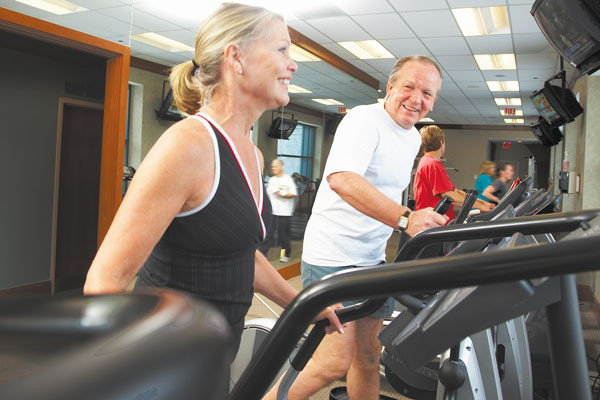
Tips to leverage neuroplasticity to maintain cognitive fitness as you age

Can white noise really help you sleep better?

Celiac disease: Exploring four myths

What is prostatitis and how is it treated?

What is Cushing syndrome?

Exercises to relieve joint pain

Think your child has ADHD? What your pediatrician can do

Foam roller: Could you benefit from this massage tool?

Stepping up activity if winter slowed you down

Common causes of cloudy urine
Staying Healthy Archive
Articles
How tough is your workout?
Exercise is healthy and safe for most folks. For kids, young adults, seniors, people who are healthy, and people who have medical issues, moderate activity is usually safe and does plenty to improve health, energy, and well-being.
How can you judge the pace of your workout? The easiest way to see how hard you're working is to describe your effort using broad categories, such as light, moderate, or vigorous (see the table below). This categorization, called "perceived exertion," is a good way to help you exercise safely. As you improve your fitness, you'll find your perception of an activity's intensity will change. For example, you might find that you are no longer short of breath when walking up a nearby hill or climbing the stairs.
5 ways the Internet can help you boost your health
Use it as a source of health information, a tracking tool, a direct line to your doctor, and a link to loved ones.
Image: Purestock/Thinkstock
People who connect socially tend to have better health. The Internet can help you connect, even long distance.
A connection to the Internet is a powerful tool, linking you to just about all of the knowledge in the world. And you can use that tool to help improve your health. "Our research shows that many older adults aren't taking advantage of that. It's not for everyone, but it's a valuable resource, and I'm cautiously optimistic that it will make a difference for most people," says Dr. Kasisomayajula Viswanath, a professor of health communication at the Harvard T.H. Chan School of Public Health.
Do financial incentives improve health?
Ask the Doctor
Most large employers now offer financial incentives to workers who make healthy lifestyle changes.
Image: PHOTOS.com/Thinkstock
Q. My employer is offering employees financial rewards if we lose weight. At first, I was shocked by this, but then I thought it might be a good thing for me, and for my employer. Does this kind of financial incentive lead to healthier lifestyles?
Do habits cause your neck pain?
Sit up straight, keep electronic screens at eye level, and try some strengthening exercises to reduce pain and feel better.
Looking down at a computer screen for prolonged periods may lead to neck pain.
Image: AndreyPopov/iStock
If your day involves using a smartphone or laptop, reading a book or magazine, or curling up on a couch to watch TV, your day may also include some nagging neck pain. That's because you may be bending your body in an unhealthy position for a prolonged period of time. "It's an overuse injury. Your body was designed to move, but you're forcing your neck and shoulders into one static position for too long," says Dr. Clare Safran-Norton, a physical therapist and clinical supervisor of rehabilitation services at Harvard-affiliated Brigham and Women's Hospital.
Spice up your dinner with foreign flavors
Indian, Peruvian, or Vietnamese food may be just the thing to give your diet a dose of interest and fun.
Vietnamese pho with shrimp is tasty. But stick to small portions of noodles to avoid spiking blood sugar.
Image: joannatkaczuk/Thinkstock
Following a healthy diet doesn't have to be boring. Take your palate on a culinary adventure by sampling world cuisines that are new to you. "Variety can add taste as well as vitamins and micronutrients you may not be receiving from your standard diet," says registered dietitian Kathy McManus, director of the Department of Nutrition at Harvard-affiliated Brigham and Women's Hospital.
What you need to know if you’re taking multiple medications
To stay on your regimen, you'll have to be organized and learn about each of your drugs.
Many older adults take five or more prescription medications, increasing the risk of harmful drug interactions.
Image: Comsstock/Thinkstock
Taking several types of medications can be challenging. But this is something you have to get right. If you don't, you may have unwanted side effects, or you may not properly treat your chronic condition. "I see people who average 15 medications, and it's very difficult for them to juggle that many pills," says Joanne Doyle Petrongolo, a pharmacist at Harvard-affiliated Massachusetts General Hospital.
Harvard study links aspirin therapy and cancer prevention
News Briefs
Image: DimaSobko/Thinkstock
A Harvard study published March 3, 2016, in JAMA Oncology adds to increasing evidence that aspirin use may help stave off colorectal cancer and suggests that aspirin is also associated with a small reduction of overall cancer risk.
Researchers looked at aspirin use among almost 136,000 men and women in two studies over 32 years. They noted that regular aspirin use—taking either a 325-mg tablet or an 81-mg tablet two or more times per week—was associated with a 3% reduction in cancers over all, although they saw no effect on major cancers like those of the breast, prostate, or lung. The researchers say the overall reduction was due mostly to a 15% risk reduction for gastrointestinal cancer and a 19% risk reduction for colorectal cancer.
New guidelines: Avoid opioids for chronic pain
News Briefs
The CDC wants doctors to stop treating chronic pain by prescribing opioids, such as oxycodone (OxyContin). The CDC published guidelines on opioid prescription March 15, 2016, in The Journal of the American Medical Association. Opioids are powerful painkillers typically used to treat severe pain after surgery or pain with terminal illness, and sometimes used to treat chronic pain. But long-term use of these drugs comes with the risk of dependence, addiction, overdose, and death, as we reported in March.
The CDC is recommending that doctors instead treat chronic pain with non-opioid painkillers, such as acetaminophen (Tylenol) or ibuprofen (Advil); anticonvulsants (gabapentin or pregabalin); tricyclic antidepressants; or serotonin-norepinephrine reuptake inhibitors. The CDC also suggests treating chronic pain with nondrug therapies, such as physical therapy. If you and your doctor feel the benefits of opioid therapy outweigh the risks, the CDC urges doctors to prescribe the lowest effective dose, and reassess risks and benefits at least every three months. The recommendation is not intended for people taking opioids for terminal illness or palliative care.
Medication-free options to treat your low back pain
News Briefs
Image: Moldboard/Thinkstock
A small study published in March 2016 in The Journal of the American Medical Association appears to support two nondrug options for treating chronic lower back pain. Researchers found that mindfulness-based stress reduction (MBSR), which includes yoga and mindfulness meditation (focusing on the moment), and cognitive behavioral therapy (CBT), which redirects pain-related thoughts and behaviors, were better at lowering back pain than usual care (other treatments received, if any).
Researchers randomly assigned more than 300 people (average age 49) to usual care or to eight weekly sessions of either MBSR or CBT. Six months later, researchers found that 45% of both the MBSR and CBT groups had less back pain, compared with 27% of the usual-care group, and about 60% of both MBSR and CBT participants had more back function, compared with 44% of those getting usual care.

Tips to leverage neuroplasticity to maintain cognitive fitness as you age

Can white noise really help you sleep better?

Celiac disease: Exploring four myths

What is prostatitis and how is it treated?

What is Cushing syndrome?

Exercises to relieve joint pain

Think your child has ADHD? What your pediatrician can do

Foam roller: Could you benefit from this massage tool?

Stepping up activity if winter slowed you down

Common causes of cloudy urine
Free Healthbeat Signup
Get the latest in health news delivered to your inbox!
Sign Up











